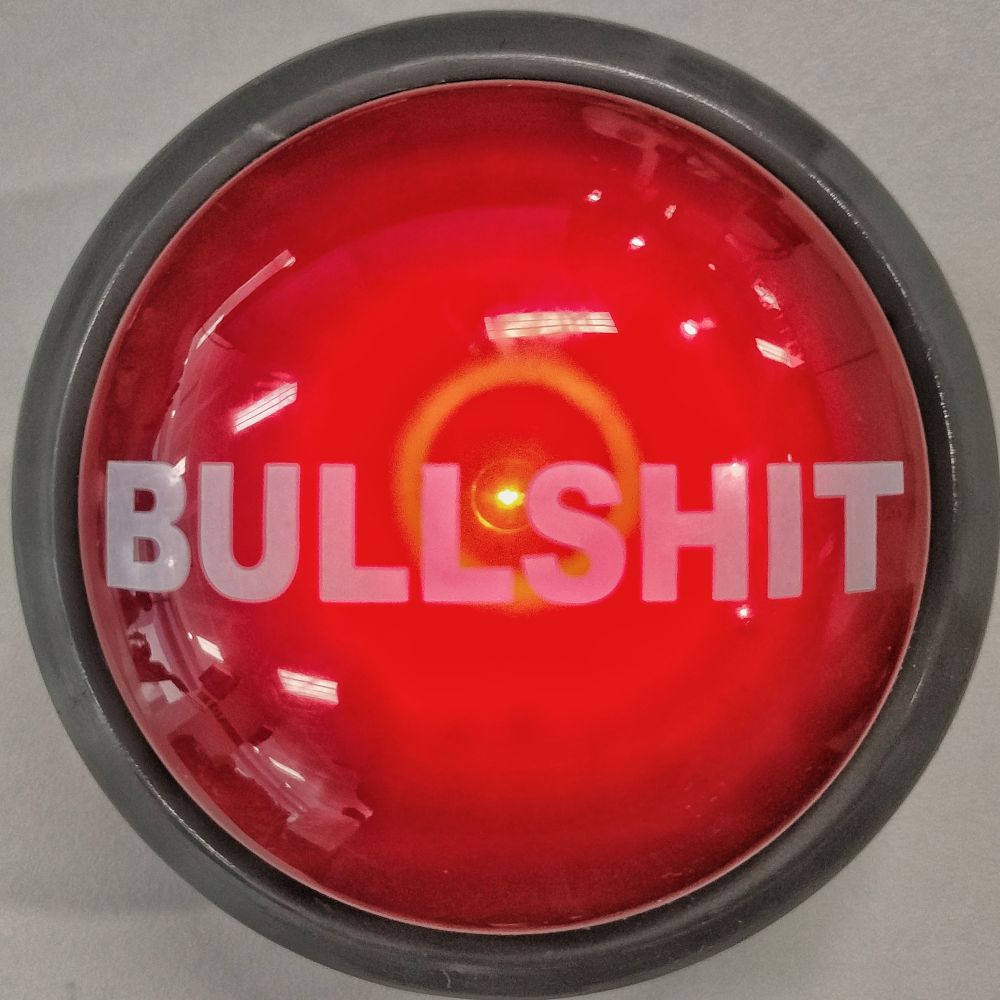It is not done to call “bullshit”: Difference between revisions
Amwelladmin (talk | contribs) No edit summary |
Amwelladmin (talk | contribs) No edit summary |
||
| Line 1: | Line 1: | ||
{{a|maxim|}}{{maxim|It is not the done thing to call bullshit in a professional setting}}. | {{a|maxim|{{image|Bullshit|jpeg|}}{{maxim|It is not the done thing to call bullshit in a professional setting}}. | ||
Given, for all their pained protestations to the contrary, any commercial organisation is a [[self-perpetuating autocracy]] we should expect a great deal ''less'' licence given to untrammeled free speech in every day practice than is virtue-signaled by the boss in his daily lectures on the telescreen | Given, for all their pained protestations to the contrary, any commercial organisation is a [[self-perpetuating autocracy]] we should expect a great deal ''less'' licence given to untrammeled free speech in every day practice than is [[Virtue-signalling|virtue-signaled]] by the boss in his daily lectures on the telescreen. | ||
People who survive for a time in an organisation are shaped and enculturated by it. They do not so much ''learn'' not to call bullshit, but are self-selected for their disposition for it ''not to occur to them'' to call bullshit. | |||
Such “brand ambassadors” in turn, are a crucial part of the recruitment process — almost ''everyone'' is part of the recruitment process somehow — and so they select people who are a “good cultural fit” — that is, ''disinclined to call bullshit or even notice it''. | |||
To be clear, “calling bullshit” is not ''actively'' repressed in the organisation — to the contrary, the executive will implore their people to do so at every opportunity, and may even mean it. For people are not punished for calling bullshit: they just ''don’t''. It is ''bred out of them''. | |||
Thus, organisations thrive and flourish despite, and not because of, their internal governance. | Thus, organisations thrive and flourish despite, and not because of, their internal governance. | ||
{{sa}} | {{sa}} | ||
*[[Consultation]] | *[[Consultation]] | ||
*[[Otto’s razor]]: don’t assume malice where incompetence is an equally good explanation. | |||
*[[Thought leader]] | *[[Thought leader]] | ||
Revision as of 14:46, 2 November 2022
{{a|maxim|
 |
It is not the done thing to call bullshit in a professional setting.
Given, for all their pained protestations to the contrary, any commercial organisation is a self-perpetuating autocracy we should expect a great deal less licence given to untrammeled free speech in every day practice than is virtue-signaled by the boss in his daily lectures on the telescreen.
People who survive for a time in an organisation are shaped and enculturated by it. They do not so much learn not to call bullshit, but are self-selected for their disposition for it not to occur to them to call bullshit.
Such “brand ambassadors” in turn, are a crucial part of the recruitment process — almost everyone is part of the recruitment process somehow — and so they select people who are a “good cultural fit” — that is, disinclined to call bullshit or even notice it.
To be clear, “calling bullshit” is not actively repressed in the organisation — to the contrary, the executive will implore their people to do so at every opportunity, and may even mean it. For people are not punished for calling bullshit: they just don’t. It is bred out of them.
Thus, organisations thrive and flourish despite, and not because of, their internal governance.
See also
- Consultation
- Otto’s razor: don’t assume malice where incompetence is an equally good explanation.
- Thought leader